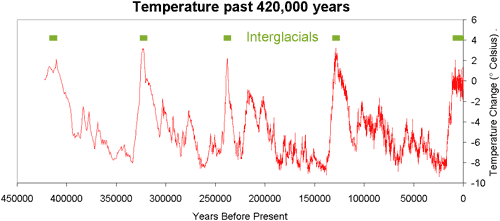 Arguments
Arguments
 Software
Software
 Resources
Comments
Resources
Comments
 The Consensus Project
The Consensus Project
 Translations
Translations
 About
Support
About
Support


Latest Posts
- Skeptical Science New Research for Week #47 2024
- Durability of carbon dioxide removal is critical for stabilizing temperatures
- Sabin 33 #3 - Solar panels generate too much waste and will overwhelm landfills
- Here’s how governments could fix their Paris climate commitment failures
- 2024 SkS Weekly Climate Change & Global Warming News Roundup #46
- Skeptical Science New Research for Week #46 2024
- 20 fact briefs published in collaboration with Gigafact!
- Sabin 33 #2 - Are toxic heavy metals from solar panels posing a threat to human health?
- 2024 will be the first year above 1.5°C
- 2024 SkS Weekly Climate Change & Global Warming News Roundup #45
- Fact brief - Is there an expert consensus on human-caused global warming?
- Skeptical Science New Research for Week #45 2024
- The planet is ‘on the brink of an irreversible climate disaster,’ scientists warn
- Sabin 33 #1 - Are electromagnetic fields from solar farms harmful to human health?
- Volunteer activity: Evaluate automated climate misinformation debunkings
- 2024 SkS Weekly Climate Change & Global Warming News Roundup #44
- Fact brief - Are most glaciers growing?
- Rebutting 33 False Claims About Solar, Wind, and Electric Vehicles thanks to the Sabin Center for Climate Change Law
- Skeptical Science New Research for Week #44 2024
- The hidden health toll of hurricanes
- Climate Adam: Is climate change fuelling mega hurricanes?
- Jobs in wind, solar, and energy storage are booming. Is your state keeping up?
- 2024 SkS Weekly Climate Change & Global Warming News Roundup #43
- Fact brief - Do volcanoes emit more CO2 than humans?
- Skeptical Science New Research for Week #43 2024
- Why widening highways doesn’t reduce traffic congestion
- Climate Risk
- Welcome to the world of personal air conditioning
- 2024 SkS Weekly Climate Change & Global Warming News Roundup #42
- Skeptical Science New Research for Week #42 2024
Archived Rebuttal
This is the archived Basic rebuttal to the climate myth "We're heading into an ice age". Click here to view the latest rebuttal.
What the science says...
|
Worry about global warming impacts in the next 100 years, not an ice age in over 10,000 years. |
According to ice cores from Antarctica, the past 400,000 years have been dominated by glacials, also known as ice ages, that last about 100,000. These glacials have been punctuated by interglacials, short warm periods which typically last 11,500 years. Figure 1 below shows how temperatures in Antarctica changed over this period. Because our current interglacial (the Holocene) has already lasted approximately 12,000 years, it has led some to claim that a new ice age is imminent. Is this a valid claim?

Figure 1: Temperature change at Vostok, Antarctica (Petit 2000). The timing of warmer interglacials is highlighted in green; our current interglacial, the Holocene, is the one on the far right of the graph.
To answer this question, it is necessary to understand what has caused the shifts between ice ages and interglacials during this period. The cycle appears to be a response to changes in the Earth’s orbit and tilt, which affect the amount of summer sunlight reaching the northern hemisphere. When this amount declines, the rate of summer melt declines and the ice sheets begin to grow. In turn, this increases the amount of sunlight reflected back into space, increasing (or amplifying) the cooling trend. Eventually a new ice age emerges and lasts for about 100,000 years.
So what are today’s conditions like? Changes in both the orbit and tilt of the Earth do indeed indicate that the Earth should be cooling. However, two reasons explain why an ice age is unlikely:
- These two factors, orbit and tilt, are weak and are not acting within the same timescale – they are out of phase by about 10,000 years. This means that their combined effect would probably be too weak to trigger an ice age. You have to go back 430,000 years to find an interglacial with similar conditions, and this interglacial lasted about 30,000 years.
- The warming effect from CO2 and other greenhouse gases is greater than the cooling effect expected from natural factors. Without human interference, the Earth’s orbit and tilt, a slight decline in solar output since the 1950s and volcanic activity would have led to global cooling. Yet global temperatures are definitely on the rise.
It can therefore be concluded that with CO2 concentrations set to continue to rise, a return to ice age conditions seems very unlikely. Instead, temperatures are increasing and this increase may come at a considerable cost with few or no benefits.
Basic rebuttal written by Anne-Marie Blackburn
Update August 2015:
Here is a related lecture-video from Denial101x - Making Sense of Climate Science Denial
Updated on 2015-08-07 by MichaelK.
THE ESCALATOR

(free to republish)
























































